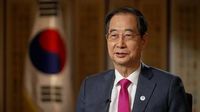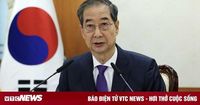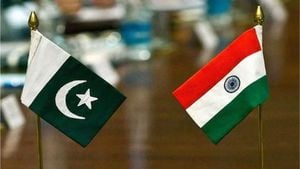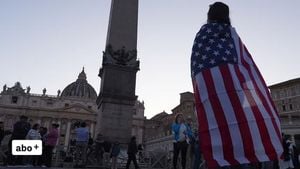On May 1, 2025, South Korean Acting President Han Duck-soo announced his resignation, paving the way for his presidential campaign set to launch on June 3, 2025. This decision comes amidst a backdrop of political turmoil following the impeachment of President Yoon Suk-yeol, who was suspended from office after imposing martial law on December 3, 2024.
In a televised address from the government complex in Seoul, Han expressed the gravity of his decision, stating, "After careful consideration of whether this decision is correct, I have decided that if this is the only path, I must follow it." His resignation is necessary as he must step down before May 4, 2025, to legally run for the presidency.
Han, who previously served as Prime Minister and was acting in the presidential role after Yoon's suspension, emphasized the need to address the extreme political divisions and economic challenges facing South Korea. He remarked, "If extreme confrontation does not end and a foundation of cooperation is not established, divisions and conflicts will continue, regardless of who holds power." Han's commitment to the nation's future and stability was clear as he declared his intent to do what is necessary to overcome the current crisis.
With Han's resignation, Finance Minister and Deputy Prime Minister Choi Sang-mok will assume the role of Acting President. Han's political career spans several administrations, and he has held various significant positions, including South Korean Ambassador to the United States and Minister of Finance and Trade. His experience is expected to play a vital role in his campaign.
The political landscape in South Korea has been tumultuous since Yoon's controversial martial law announcement. Following the impeachment proceedings, Han faced suspension himself due to disagreements with the National Assembly, but the Constitutional Court later overturned his impeachment, allowing him to continue as Acting President until the upcoming election.
The presidential election is seen as a pivotal moment for South Korea, especially in light of rising tensions in East Asia and economic pressures stemming from slow growth and internal instability. The government has officially set June 3, 2025, as the date for the election, following discussions with the National Election Commission regarding the electoral calendar.
Currently, Lee Jae-myung, leader of the opposition Democratic Party, is the frontrunner in the polls with approximately 42% support, significantly ahead of Han, who is polling at around 13%. Lee narrowly lost to Yoon in the 2022 elections and is now positioned to capitalize on the current political climate. However, he is also facing legal challenges related to allegations of election law violations and bribery, which could impact his campaign.
As Han prepares to officially announce his candidacy on May 2, he faces a challenging road ahead. The political dynamics are shifting rapidly, and the upcoming election will not only determine the next president but also the direction of South Korea's policies and governance in the years to come.
In his resignation speech, Han emphasized his dedication to the country, stating, "Ultimately, I decided to resign to do what I can, to do what I must do, to help us overcome the crisis we are facing." His commitment to addressing the pressing issues of political strife and economic challenges resonates with many voters.
With the election just weeks away, Han's decision to step down and run for president marks a significant moment in South Korean politics. His experience and insights into both domestic and international issues will be crucial as he seeks to rally support and navigate the complexities of the upcoming campaign.
As the nation braces for the election, the outcome will be closely watched, not only for its immediate implications but also for the long-term stability and direction of South Korea in a rapidly changing geopolitical landscape. The stakes are high, and the electorate is keenly aware of the importance of their choice.





